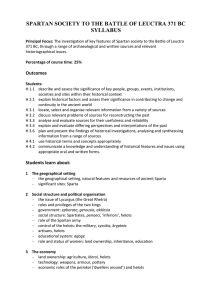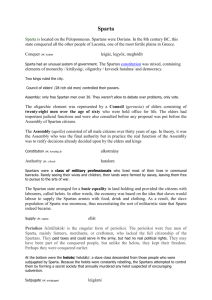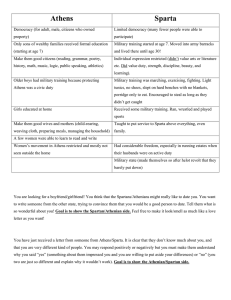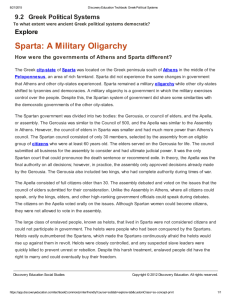Sparta Text Reading
advertisement
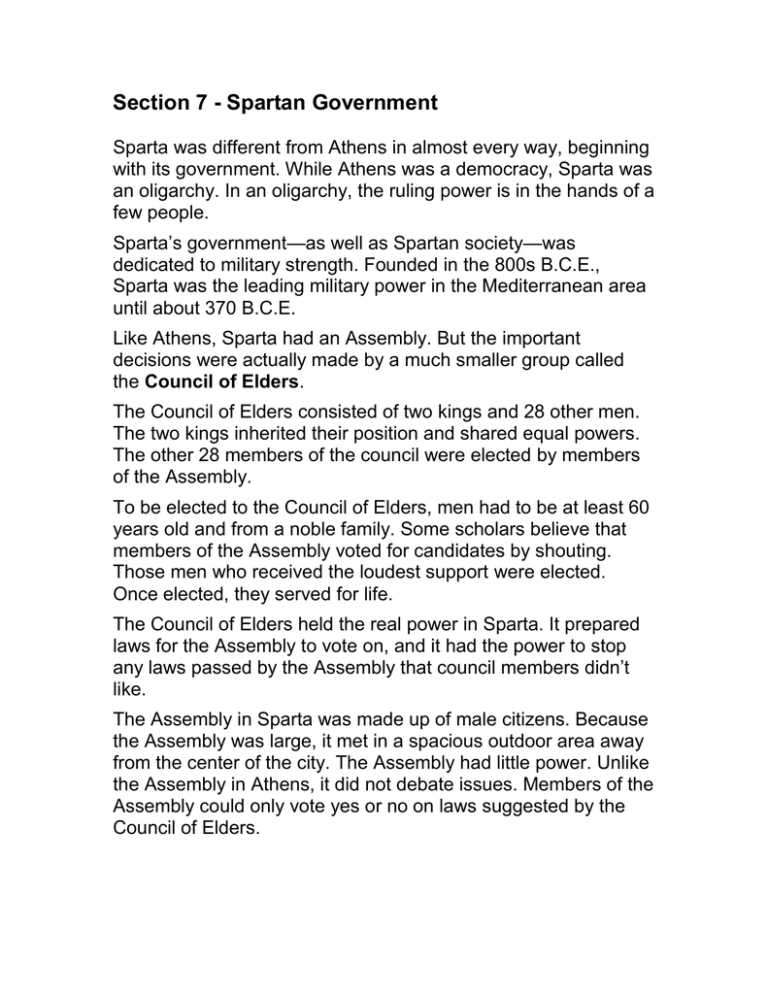
Section 7 - Spartan Government Sparta was different from Athens in almost every way, beginning with its government. While Athens was a democracy, Sparta was an oligarchy. In an oligarchy, the ruling power is in the hands of a few people. Sparta’s government—as well as Spartan society—was dedicated to military strength. Founded in the 800s B.C.E., Sparta was the leading military power in the Mediterranean area until about 370 B.C.E. Like Athens, Sparta had an Assembly. But the important decisions were actually made by a much smaller group called the Council of Elders. The Council of Elders consisted of two kings and 28 other men. The two kings inherited their position and shared equal powers. The other 28 members of the council were elected by members of the Assembly. To be elected to the Council of Elders, men had to be at least 60 years old and from a noble family. Some scholars believe that members of the Assembly voted for candidates by shouting. Those men who received the loudest support were elected. Once elected, they served for life. The Council of Elders held the real power in Sparta. It prepared laws for the Assembly to vote on, and it had the power to stop any laws passed by the Assembly that council members didn’t like. The Assembly in Sparta was made up of male citizens. Because the Assembly was large, it met in a spacious outdoor area away from the center of the city. The Assembly had little power. Unlike the Assembly in Athens, it did not debate issues. Members of the Assembly could only vote yes or no on laws suggested by the Council of Elders. Section 8 - Spartan Economy Click to read caption While Athens’s economy depended on trade, Sparta’s economy relied on farming and on conquests of other people. Although Sparta had fertile soil, there was not enough land to provide food for everyone. When necessary, Spartans took the lands they needed from their neighbors, who were then forced to work for Sparta. Because Spartan men were expected to serve in the army until the age of 60, Sparta had to rely on slaves and noncitizens to produce the goods it lacked. Conquered villagers became slaves, called helots. The helots were allowed to live in their own villages, but they had to give much of the food they grew to Sparta. The Spartans also made use of a second group of people— noncitizens who were free. Noncitizens might serve in the army when needed, but they could not take part in Sparta’s government. They were responsible for making such necessary items as shoes, red cloaks for the soldiers, iron tools like knives and spears, and pottery. They also conducted some trade with other city-states for goods that Sparta could not provide for itself. In general, though, Sparta discouraged trade. The Spartans feared that contact with other city-states would lead to new ideas that might weaken the government. Trading with Sparta was already difficult because of its system of money. Rather than use coins, Spartans used heavy iron bars as money. According to legend, an ancient Spartan leader decided to use this form of money to discourage stealing. An iron bar had little value. Section 9 - Education in Sparta Chapter Home Click to read caption In Sparta, the purpose of education was to produce capable men and women who could fight to protect the city-state. Spartans were likely to abandon sickly infants who might not grow up to be strong soldiers. Spartans highly valued discipline and strength. From the age of 7, all Spartan children trained for battle. Even girls were given some military training. They learned wrestling, boxing, footracing, and gymnastics. Spartan boys lived and trained in buildings called barracks. Boys learned to read and write, but those skills were not considered as essential as military skills. The most important Spartan goal was to be a brave soldier. Spartan boys were taught to suffer any amount of physical pain without complaining. They marched without shoes. They were not well fed; in fact, they were encouraged to steal food, as long as they did not get caught. One Spartan legend tells of a boy who was so hungry, he stole a fox to eat. But seeing his teacher coming, the boy quickly hid the fox under his cloak. The boy chose to let the fox bite him in the stomach rather than be caught stealing by his teacher. At about the age of 20, Spartan men were given a difficult test of fitness, military ability, and leadership skills. If they passed, they became Spartan soldiers and full citizens. Even then, they continued to live in soldiers’ barracks, where they ate, slept, and trained with their classmates. A man could not live at home with his wife and family until he was 30 years old. At the age of 60, Spartan men could retire from the army. Section 10 - Women and Slaves in Sparta Spartan women lived the same simple life as Spartan men. They wore plain clothing with little decoration. They did not wear jewelry or use cosmetics or perfume. Like Spartan men, women were expected to be strong and healthy—and ready to fight when needed. A wife was expected to look after her husband’s property in times of war. She also had to guard it against invaders and revolts by slaves. Spartan women had many rights that other Greek women did not have. They were free to speak with their husbands’ friends. Women could own and control their own property. They could even marry again, should their first husband be away at war for too long a time. Spartan slaves, the helots, were people the Spartans had conquered. There were many more helots than citizens in Sparta. The Spartans treated the helots harshly, fearful that the helots would revolt. Sometimes, the Spartan government declared war on the helots so that any slaves it thought might rebel could be legally killed. In fact, the Spartan government once asked the helots to choose their best fighters. The Spartans said that these slaves would be set free as thanks for fighting for Sparta. The helots chose two thousand men. Immediately, the Spartans killed every one of them to eliminate the possibility of any future helot leaders. Despite this harsh treatment, helots did have some rights. They could marry whomever and whenever they wanted. They could pass their names on to their children. They could sell any leftover crops after giving their owner his share. Helots who saved enough money could even buy their freedom.



